Tired of battling weight gain, constant fatigue, cold hands and feet, and other annoying symptoms associated with hypothyroidism, or an underactive thyroid? You may be surprised to know that herbs that can help your thyroid! In this blog, you’ll learn how to use four powerful herbs for your thyroid health: ashwagandha, black cumin seeds, peppermint, and guggul. Keep reading to learn how these herbs can transform your thyroid health!
Ashwagandha: The Stress-Relief Hero
Also called Indian ginseng, ashwagandha (Withania somnifera) is famous for reducing stress and boosting resilience. But did you know it may also support your thyroid health?
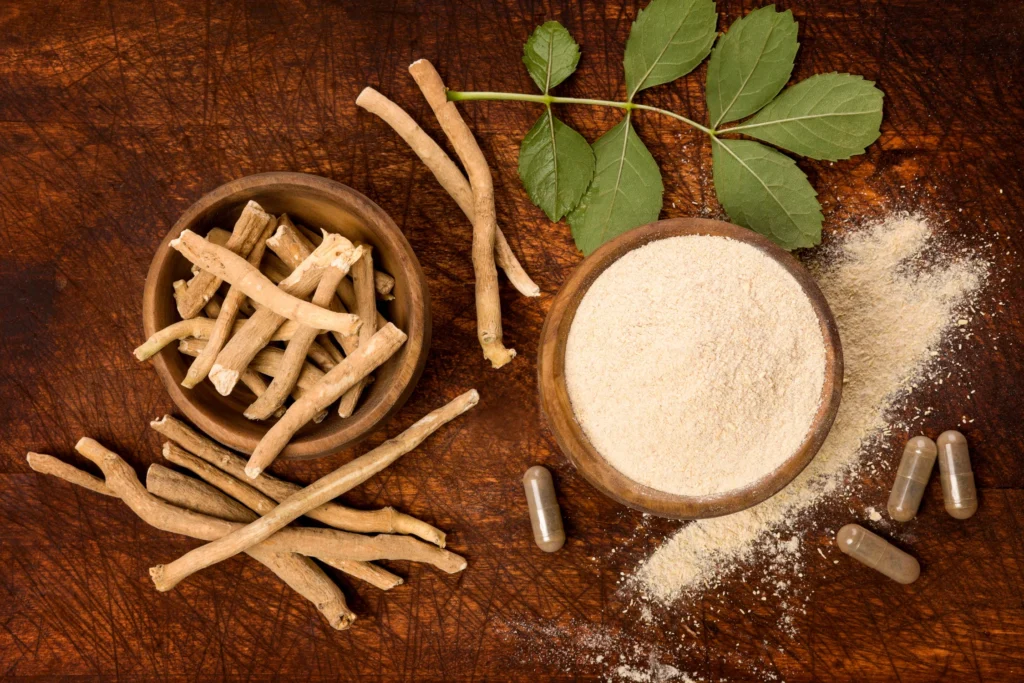
A 2017 study found that taking 300 mg of ashwagandha root extract twice daily (600 mg total per day) could benefit people with subclinical hypothyroidism (1), which basically means the beginning of a sluggish thyroid. This condition happens when thyroid-stimulating hormone (TSH) levels are high, but thyroxine (T4) levels are still normal. (Not sure what TSH and T4 are? Check out Do I Have a Thyroid Problem? to learn more!)
Over just eight weeks, researchers noticed some amazing changes: T4 levels increased by 20% and TSH levels dropped closer to normal by 17% (1), normalizing the thyroid hormone profile.
But wait, there’s more! Ashwagandha can also help with (2):
- Reduced food cravings
- Lower stress and cortisol levels
- Improvements in body weight and Body Mass Index (BMI)
Ashwagandha belongs to a group of herbs known as adaptogens. They help your body “adapt” better to stress and become more resilient. Think of it as a buffer that makes stressful situations feel less overwhelming. Many people notice that things that used to set them off—like work deadlines, challenging coworkers, or even the chaos of parenting—no longer get under their skin as much. For example, postpartum moms or parents of mischievous toddlers often share that they feel calmer and less frazzled, even when their little ones turn the living room into a playground. By helping to raise our threshold for stress, adaptogens like ashwagandha can benefit the entire body, including supporting thyroid health.
Dosage:
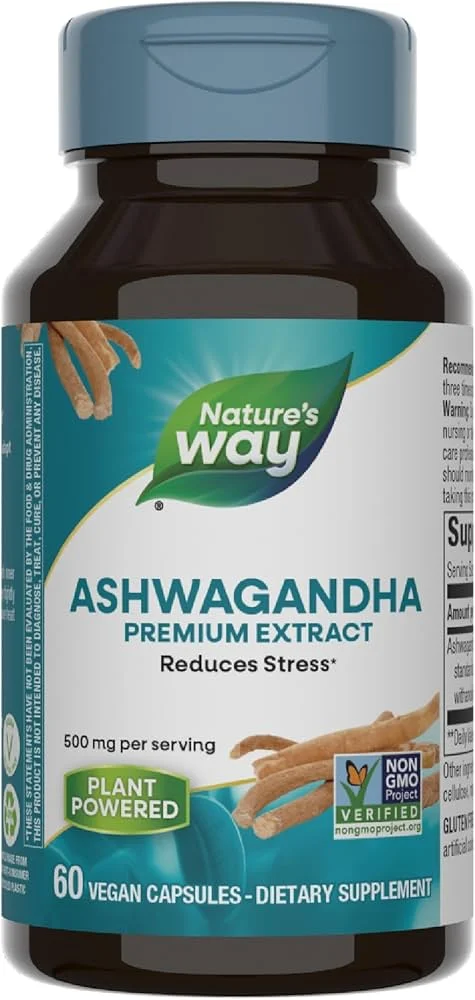
- Capsule/powder: 300-500 mg twice a day, must be standardized to at least 3.5-5% withanaloids
- Example: Nature’s Way Ashwaganda Premium Extract (500 mg/capsule; standardized to 3.5% withanaloids), take 1 capsule twice a day.
- Note: We suggest taking ashwagandha twice daily for a total of 1000mg, as this particular extract contains 3.5% concentration compared to the 5% extract used in the study mentioned above.
- Example: Nature’s Way Ashwaganda Premium Extract (500 mg/capsule; standardized to 3.5% withanaloids), take 1 capsule twice a day.
- Tincture: 2-4 ml (40-80 drops), three times a day
Precaution:
- Ashwagandha is considered safe with no known toxicity with normal dosages.
- Avoid if you have a current respiratory infection or excessive congestion.
- Avoid if you are sensitive to plants in the nightshade family (3).
- Avoid if you have hyperthyroidism (overactive thyroid) (3).
Black Cumin Seeds: Tiny but Mighty
Black cumin seeds (Nigella sativa), often called black seeds, have been used for thousands of years as a cooking spice and a natural remedy. It is often regarded as a holy spice in traditional Islamic medicine. Recent studies show these tiny seeds can work big wonders for hypothyroidism!
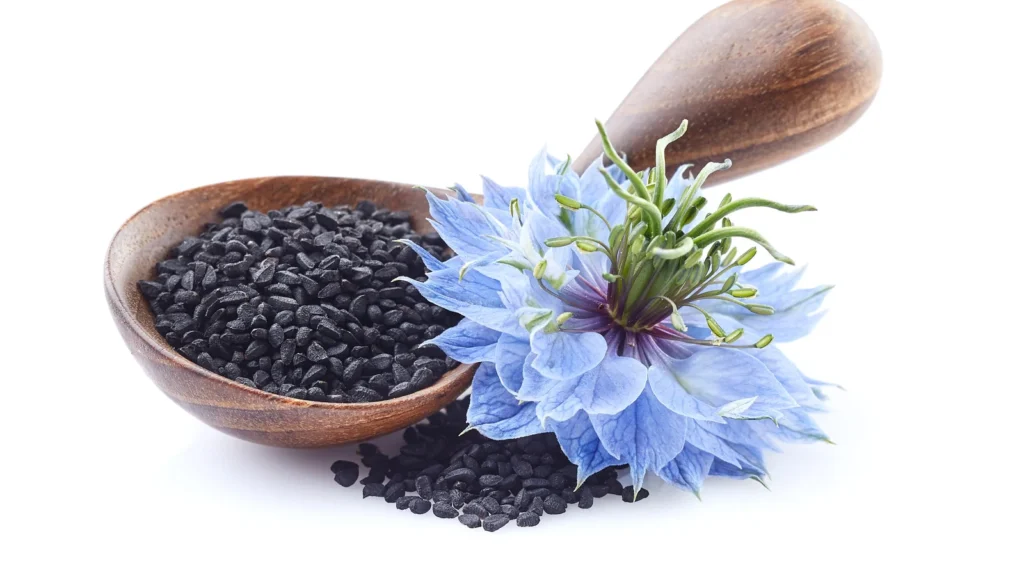
In one study, participants took 2 grams of black cumin seed powder daily for eight weeks. The results were incredible (4):
- Lower body weight and BMI
- Improved cholesterol levels: LDL (“bad” cholesterol) decreased, and HDL (“good” cholesterol) increased.
- Better thyroid health: TSH levels dropped closer to normal, anti-TPO antibodies decreased (Remember anti-TPO, the hitmen in the thyroid factory? Check out Do I Have a Thyroid Problem? to review how your thyroid works), and triiodothyronine (T3) hormone levels improved—speeding up metabolism!
Dosage:
- Capsule/powder: 2000 mg/day
- Example: Mountain Rose Herbs’s Organic Black Seed
- Direction:
- Grind whole black seeds into fine powder using a coffee/spice grinder, blender, or food processor
- Take 1/2 tsp (=2000 mg) per day; you can add to your granola, oatmeal, or smoothie
- You can also purchase black seeds from credible online herb sellers such as Starwest Botanicals and Fronteir Co-op
- Direction:
Precautions:
- Avoid taking supplemental forms of black cumin seeds when pregnant. Black cumin seeds may interfere with the uterus from contracting. Black cumin seeds in food doses are okay (5).
- Avoid if you have blood clotting disorders. Black cumin seeds may increase the risk of bleeding (5).
Peppermint: The Energy Booster
Peppermint (Mentha x piperita) is probably one of the easiest herbs you can find in your kitchen, but it’s more than just a refreshing tea ingredient! Research shows that inhaling peppermint essential oil blend for 15 minutes a day can improve fatigue symptoms in as little as 14 days (3).
If you’ve been struggling with low energy—a common symptom of hypothyroidism—peppermint might be just what you need to feel more energized and improve your quality of life.
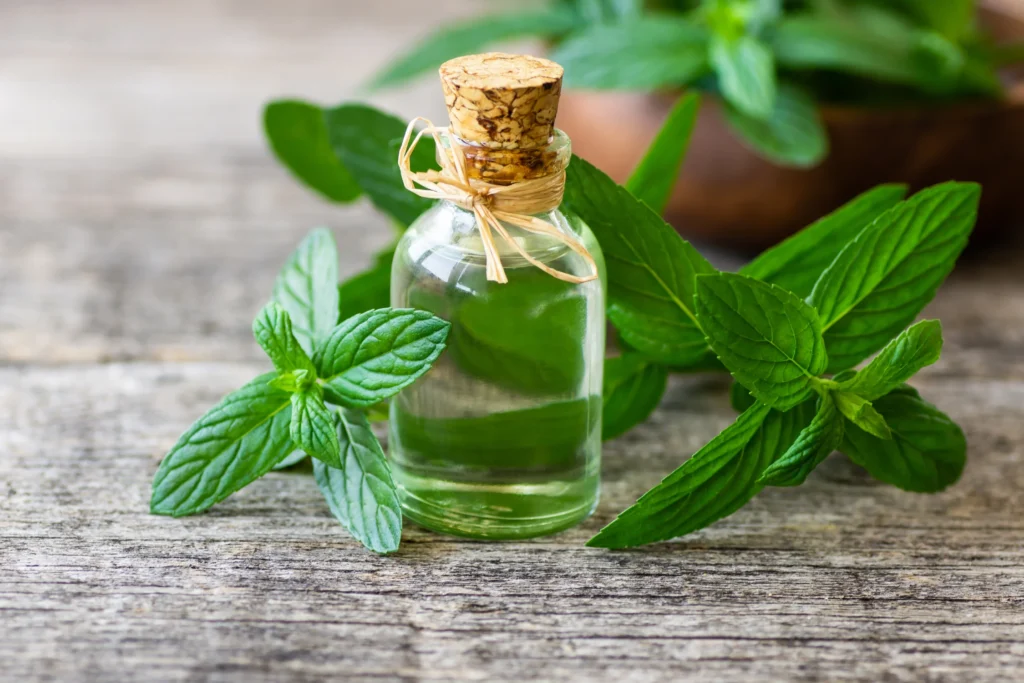
How to inhale peppermint essential oil (6):
- In the study mentioned above, researchers used an essential oil blend consisted of black pepper, clove bud, white grapefruit, white grapefruit, and and. Peppermint is the most important ingredient, so you can focus on just getting that or you can semi-recreate the blend by placing 3 drops of peppermint essential oil for 1 drop of each of the other oils. You can buy the same products used in the study here (not sponsored).
- Place 3 drops of the blend onto a inhaler stick and inhale the oils for 15 minutes. Check out this aroma inhaler as a reference (not sponsored)
- Draw away from the inhaler slightly if burning sensation occurs.
- You can drink plain water during inhalation, but no other food or drink.
Precaution (7):
- Peppermint is generally safe for everyone.
- If you’re pregnant or breastfeeding make sure the essential oil doesn’t come in contact with your skin.
- In some sensitive individuals, peppermint can cause heartburn.
- If taken in excess, peppermint can dry up breast milk .
Guggul: Medicine Straight from the Resin
Commonly known as Indian Mryrrh (Commiphora wightii), and not to be confused with the Arabic myrrh species, guggul comes from the resin of the guggul tree. It’s famous in Ayurvedic medicine for managing high cholesterol, obesity, and liver dysfunction (8). But here’s the exciting part: guggul might also give your thyroid a boost (6)!
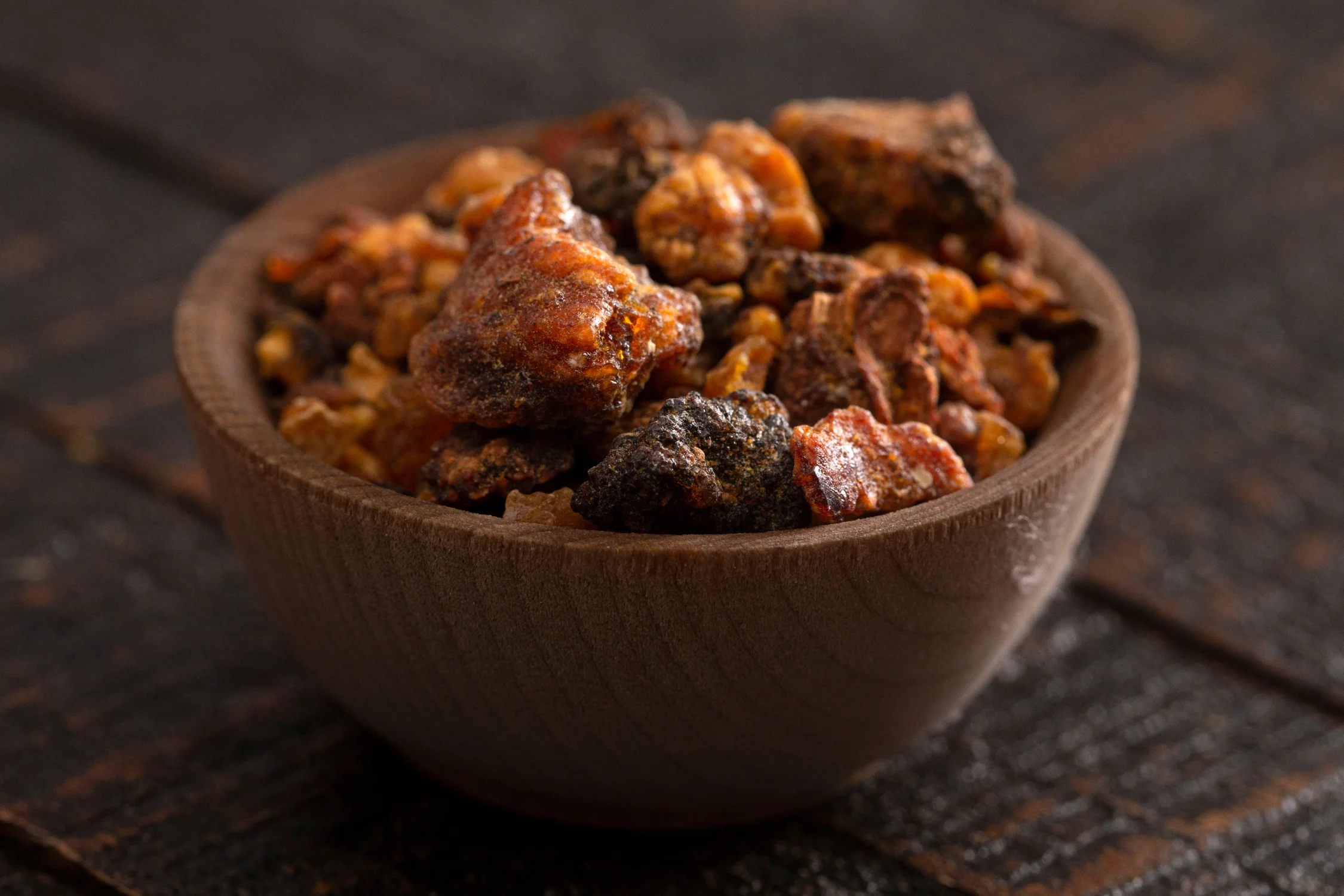
In fact, one clinical study found that guggul improved (9):
- T3 levels by 24%
- T4 levels by 27%
- TSH levels by 46%
- And even reduced cholesterol levels by 10%!
Dosage:
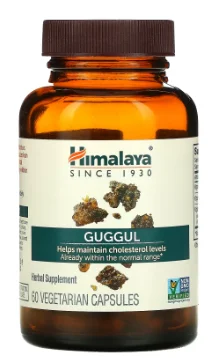
- 600-1200 mg a day (10)
- Example: Himalaya Wellness’s Guggul (390 mg guggul extract/capsule), take 1 capsules twice a day with food
Precaution:
- Doses greater than 2-4 grams can cause kidney problems and heart rate changes (10), so don’t exceed that dose!
Keep in mind that these supplements should only be taken under the guidance & care of a registered dietitian or healthcare provider for your safety. We always help our patients navigate combinations of supplements and medication safely. If you’re on any other medications, please never combine them with supplements without consulting with an experienced provider first.
Other Natural Ways to Treat Hypothyroidism
Tried the herbal remedies we discussed earlier but still on the hunt for natural solutions? Don’t worry—there are more options to explore!

- Turmeric: Turmeric isn’t just a staple spice in Indian cuisine—it’s also a powerhouse of health benefits. Its vibrant yellow hue comes from curcumin, the active compound responsible for its anti-inflammatory and antioxidant properties. Curcumin has been studied for its positive effects on bone health, metabolic diseases, diabetes, and even depression (11). It even demonstrated ability to combat autoimmune diseases such as Hashimoto’s, which is the most common cause of hypothyroidism, by reducing inflammation in the body (12).
- Dosage:
- Capsule/Power: you can take 1-10 g/day of the whole turmeric powder (used in cooking), or 300-4000 mg of the curcumin extract (standardized to 95% curcuminoids)
- Example: NOW foods’s curcumin (665 mg turmeric root extract; standardized to 95% curcuminoids), take 1 capsule 1-2 times a day
- Tincture: 1-5 ml (20-100 drops), three days a day
- Capsule/Power: you can take 1-10 g/day of the whole turmeric powder (used in cooking), or 300-4000 mg of the curcumin extract (standardized to 95% curcuminoids)
- Dosage:
Precautions:
- Avoid turmeric if you are taking blood thinners or have known blood clotting disorders

Acupuncture:
While not an herb, acupuncture can be a powerful ally for thyroid health. Research has shown that compared to taking T4 medication alone, acupuncture significantly lowered thyroid antibody levels and more effectively normalizes thyroid hormones, including free T3, free T4, and TSH (13).
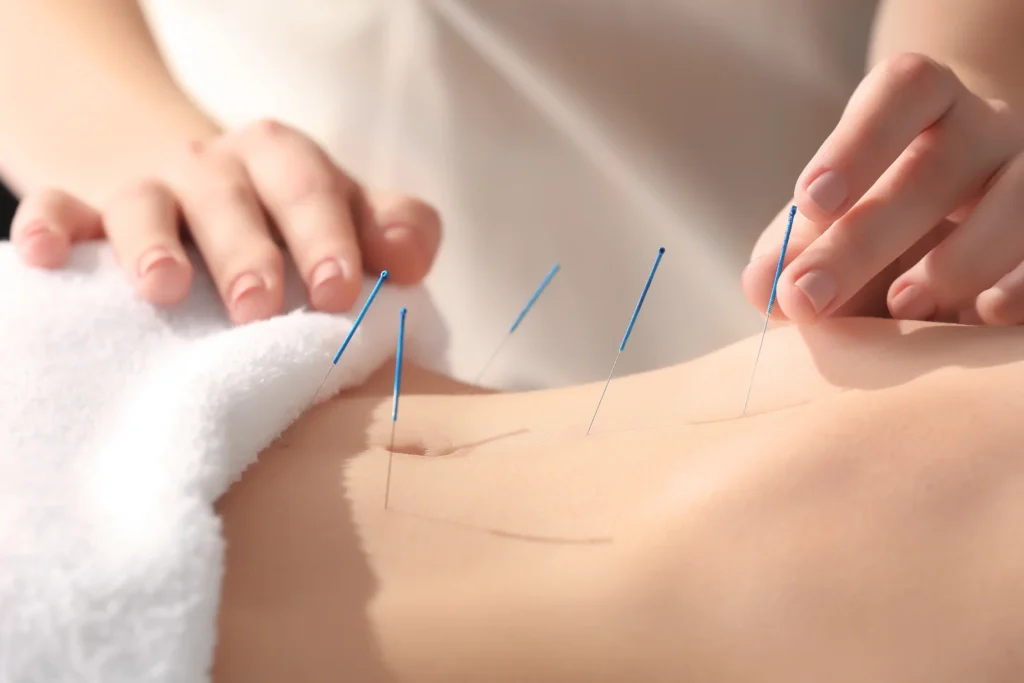
Careful! Don’t Risk Your Health with Low-Quality Supplements
When buying supplements, quality matters! Many supplements on the market are questionable, with some even being adulterated. For instance, did you know that turmeric is sometimes substituted with orange-dyed powder? This is why we’re very selective about where our patients purchase their supplements.
One source we recommend is Fullscript. Fullscript is a trusted portal that provides high-quality supplements that undergo frequent quality testing. Fullscript ensures all products are batch-tested, and questionable sellers aren’t allowed on their platform. Access is also secure; only those with a practitioner-provided link, like the one we’ve shared below, can purchase. This helps ensure you’re getting quality supplements through a verified source. And a bonus when using the Fullscript link below, you’ll get an exclusive 20% discount on all supplements! There are many affordable, top-quality brands like Now Foods and more, so you can prioritize your health without breaking the bank. Just click here to get started. Note: None of the supplement hyperlinks in this article are sponsored.
Unfortunately, Fullscript is only accessible for US-based individuals. If you don’t live in the United States & can’t access Fullscript, you can purchase many of the same supplements from iHerb.
Conclusion
Hypothyroidism can feel like an uphill battle, but incorporating natural remedies into your routine might provide the boost to your thyroid needs.
That said, addressing your diet and lifestyle simultaneously is essential. Remember: NO PILL WITHOUT A SKILL! Herbal medicine cannot compensate for an unhealthy lifestyle—it serves only to enhance a solid, healthy foundation.
Your journey to better thyroid health is unique. Once you’ve improved your diet and lifestyle, consider exploring natural herbs to complement your healing process and take the next step toward wellness.
For more insights, be sure to check out other blogs in this series:
Blog 1: Do I Have a Thyroid Problem?
Blog 2: Fuel Your Thyroid: What is a Hypothyroidism Diet?
Blog 4: Should I take Hypothyroid Medication?
Looking for more personalized support? Discover our nutrition counseling services and start your thyroid health journey today!
References
- Sharma AK, Basu I, Singh S. Efficacy and Safety of Ashwagandha Root Extract in Subclinical Hypothyroid Patients: A Double-Blind, Randomized Placebo-Controlled Trial. J Altern Complement Med. 2018;24(3):243-248. doi:10.1089/acm.2017.0183.
- Choudhary D, Bhattacharyya S, Joshi K. Body Weight Management in Adults Under Chronic Stress Through Treatment With Ashwagandha Root Extract: A Double-Blind, Randomized, Placebo-Controlled Trial. Journal of Evidence-Based Complementary & Alternative Medicine. 2017;22(1):96-106. doi:10.1177/2156587216641830.
- Winston D, Maimes S. Ashwagandha. In: Adaptogens. ; 2007:157-161.
- Farhangi MA, Dehghan P, Tajmiri S. Powdered black cumin seeds strongly improves serum lipids, atherogenic index of plasma and modulates anthropometric features in patients with Hashimoto’s thyroiditis. Lipids Health Dis. 2018;17(1):59. doi:10.1186/s12944-018-0704-x.
- MedlinePlus. Black Seed. Accessed December 26, 2024. https://medlineplus.gov/druginfo/natural/901.html#:~:text=Special precautions & warnings:,weeks before a scheduled surgery.
- Hawkins J, Hires CY, Dunne EW, Keenan LA. Aromatherapy reduces fatigue among women with hypothyroidism: A randomized placebo-controlled clinical trial. J Complement Integr Med. 2019;17(1). doi:10.1515/jcim-2018-0229.
- National Center for Complementary and Integrative Health. Peppermint Oil. October 2020. Accessed January 10, 2025. https://www.nccih.nih.gov/health/peppermint-oil.
- Patel K. Guggul benefits, dosage, and side effects. Examine. October 12, 2024. Accessed December 26, 2024. https://examine.com/supplements/guggul/?show_conditions=true.
- Suvarna HP, Acharya S, Nagappa AN. Clinical Evaluation of Shuddha guggulu In hypothyroidism Patients. Value Health. 2015;18(3):A56. doi:10.1016/j.jval.2015.03.330.
- MYRRH: Overview, Uses, Side Effects, Precautions, Interactions, Dosing and Reviews. Accessed January 10, 2025. https://www.webmd.com/vitamins/ai/ingredientmono-570/myrrh
- Damianou A, Solomon T, Guerrini G. Curcumin. Examine. March 20, 2024. Accessed December 26, 2024. https://examine.com/supplements/curcumin/?show_conditions=true.
- Bright JJ. Curcumin and autoimmune disease. Adv Exp Med Biol. 2007;595:425-451. doi:10.1007/978-0-387-46401-5_19.
- Wang X, Li Y, Xie H, et al. Effect of acupuncture on Hashimoto thyroiditis: A systematic review and meta-analysis. Medicine (Baltimore). 2024;103(9):e37326. doi:10.1097/MD.0000000000037326.


